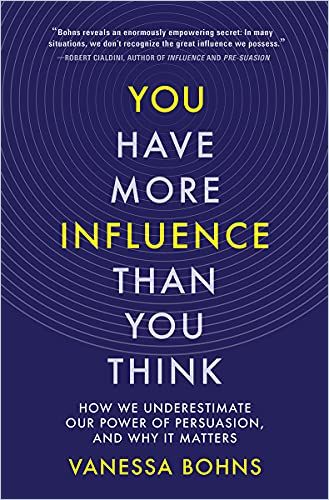Your actions, words and mere presence have an impact. An organizational psychologist reveals how to wield that power consciously.

Learn Your Own Power – and How to Use It for Good
Organizational psychologist Vanessa Bohns has delivered an unusual book on influence. Instead of teaching readers how to boost their influence and exert more interpersonal power, Bohns makes the case that people are constantly influencing one another in profound, powerful and not necessarily positive ways. To wield their power more purposefully, they need only recognize what’s already happening.
Bohns, a professor of organizational behavior at Cornell University, applies her background in psychology to the study of management and organizational behavior. Her studies in consent and compliance reveals surprising insights into everyday influence.
As we lumber through our everyday lives, not seeing past our noses, we leave behind our own impact on the various people we encounter throughout our day.Vanessa Bohns
In essence, Bohns writes, you’re likely significantly underestimating your influence in everyday interactions. As you go about your day, people notice you more than you think; your behavior, words and mere presence leave a wake. The effect magnifies when people like you, and people like you more than you think they do, too. People also are more prone to say yes to requests than you might think – even to ethically or legally dubious ones.
Just say no? It might not be so easy
Bohns offers copious evidence to support the notion that people influence others more easily and powerfully than they realize. In one study, student volunteers approached strangers to ask for a small favor, such as the use of their cellphone. Prior to the experiment, the volunteers predicted that they would have to ask six people, on average, before they found a willing participant. In fact, they had to approach only two.
People tend to be more agreeable, less resistant, less critical and more passive than commonly expected, Bohns shows. In another experiment, a full 94% of people standing in line to use a photocopier let a person who claimed to be in a rush cut in line, but the same number allowed a person who offered no reason at all to cut in line. Bohns even attributes the 2008 financial crisis in part to the power of asking: Moody’s, the once-revered credit ratings firm, apparently boosted its ratings on subprime mortgages based solely on the request of an executive at a mortgage lending firm.
You are quietly and subtly influencing the people around you all the time – without even trying, and often without realizing it.Vanessa Bohns
Bohns finds a root cause of influence in the fact that people feel uncomfortable causing embarrassment – to themselves or to others. In one of the more memorable research findings cited in the book, Bohns notes that due to a general fear of embarrassment, some 5,000 people die unnecessarily each year by quietly choking to death on their food rather than make a scene by signaling for assistance.
Avoiding embarrassment usually doesn’t have life-or-death consequences, but it does mean, Bohns argues, that people harbor a strong disinclination to say no. An aversion to saying no can spring from other sources, too: a desire to preserve a kind and generous self-image, for example, or because people might perceive saying no as potentially harmful to their career – according to Bohns, a chief factor in workplace power abuses.
We’re all influencers
People regularly influence one another in less overt ways, too. The phenomenon of behavioral contagion means people subconsciously adjust their views to align with those of others in their environment. Bohns speculates that Hillary Clinton, by agreeing to speak at corporate functions, might have inadvertently exposed herself to behavioral contagion and softened her hardline views on Wall Street as a result. Behavioral contagion accounts for the way choices – such as mounting solar panels on the roof of your house – can spread and become normalized.
People tend to believe statements they hear or read unless they already have strong counter opinions, and, according to Bohns, they don’t pay a lot of attention to details or logic in the first place. Combine these propensities with the reach of social media, and it’s clear how easily misinformation and outrage can propagate.
Bohns argues that people don’t notice the might of their influence due to cognitive biases and a simple lack of awareness: Often, the influence plays out long after the influencer has left the scene. Because people don’t recognize their influence – or the potential for it – they miss out on opportunities that might have hinged on a simple ask. But they can also mindlessly do harm.
With power comes responsibility
People’s failure to recognize the might of their influence can lead them to misuse it, often with harrowing results. Bohns cites the example of the former Rutgers basketball coach Kevin Bannon, who introduced a traumatizing strip-poker style drill to his team’s training sessions. Bannon, oblivious to the weight of his influence over his players, maintained that the drill was voluntary. Two team members, Josh Sankes and Earl Johnson, left Rutgers and sued Bannon for sexual harassment.
Even an offhand suggestion by someone in power can feel like a command to someone in a position of low power.Vanessa Bohns
Bohns concludes her treatise with practical suggestions for becoming more cognizant of your own influence – a transformative process of transcending self-centeredness and developing empathy. This kind of advice might not be what people who pick up a book on influence want, but it just might be what they need.
A breezy, conversational style and lots of interesting anecdotes make Bohns’s book a swift and engaging read. Some readers might find the text repetitive; I appreciated its lucid organization and frequent recaps and summaries. Released in 2021, the book garnered high praise from organizational psychologist Adam Grant and social scientist Daniel Pink, as well as a Financial Times ranking of Top Business Title of the Month. Notre Dame’s Deloitte Center for Ethical Leadership named it a 2021 Best Book for Ethical Leaders.
In Bohns’s telling, it appears scarily easy to get people to do what you want them to do. You don’t need to shout, offer money or twist arms. Thought-provoking, empowering and emboldening, her book offers a radical, research-based perspective on influence that centers ethics. Bohns exhorts readers to become aware of their influence so they can use it more purposefully – and more responsibly.













